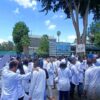Its emerging that the ravages caused to citizens by COVID 19 go beyond health and economic distress, and countries must scale up joint efforts to mitigate threats to peace and security especially violent extremism and terrorism. The adverse impact the pandemic including the hard economic conditions has left on communities has escalated the push factors for recruitment into criminal groups which now target the youth rendered jobless and out of school and with access to online information platforms. Kenya is aware of these trends and seems intent on reshaping and scaling up her efforts to deal with the problem of terrorism.
Kenya’s importance in shaping her interventions to terrorism amidst the threats posed by COVID-19 lies in the fact that the country in addition to having mounted a very elaborate strategy on terrorism including passing laws and administrative codes on the same, is now a United Nations Security Council Elected Member (2021-20), thus should be in the forefront in leading the continent on implementing innovative ways of bringing peace globally. Among the key allies in doing this is the media, as a critical player.
Media in Kenya should prioritize not only focusing the work the country is doing on peace and security issues as an international obligation, which comes with being a member of the UN Security Council, thus put her on the global map, but scrutinize her interventions on such actions on dealing with terrorism within acceptable international best practices. Upholding the rule of law during such interventions and ensuring security of citizens by investing in interventions that de escalate the push and pull factors into violent extremism including COVID 19. Media should interrogate and familiarize themselves with how the country is re-inventing and adjusting her national strategy on terrorism in the lessons learnt with the outbreak of COVID-19.
Major global powers use foreign relations and diplomacy as principle strategies to position themselves at vantage points in the economic, political and cultural order. The West, led by the US, and China, appreciate that to push their agenda into the global arena and lobby to place their citizens into powerful strategic regional and global institutions, they must speak to them through the media.
As shown over the years, media is a central player in not only presenting the substance of such diplomatic endevours, but when focused on such matters can work towards allowing members elect the most suitable candidate. It is time the media in Kenya and the officials running our foreign policy borrowed a leaf from such a strategy and began to sensitise our media on the importance of playing the game of diplomacy for our good as a nation.
Investigative journalism that focuses on the sources of funding to these groups and exposing such is critical, as many of these activities are done under the cover of darkness. It is critical that Kenya’s National Countering Terrorism Center works closely with media to enable them understand the emerging trends in terrorism, especially the re-energized activities that have occurred because of the COVID-19, and why innovative ways of dealing with these threats are urgent. Media is a major pillar in Kenya’s national strategy on countering violent extremism.
This calls for mounted efforts and interventions by the international community to work on innovative and creative ways of breaking these criminal chains. Key focus should be on recruitment cartels especially the horn of Africa, sources of funds for the groups especially via money laundering and illegal money transfers and ensuring responsible access to online platforms that expose the youth to violent groups’ information sources.
During a recent briefing on threats to international peace and security caused by terrorist acts to by Amb Martin Kimani, he noted that the economic crises caused by the pandemic are making economic conditions tougher on the population and offering more opportunities for disenchantment and division, which terrorists can exploit such conditions to spread their toxic ideology for recruitment and radicalisation. He noted that in Africa, especially in conflict zones, Al Qaeda and ISIS and their affiliates, splinters or copycats are expanding recruitment and radicalisation into violent extremism conducive to terrorism.
Amb Kimani expressed his concern that a resurgent Al-Shabaab that is adapting to the COVID-19 crisis by establishing cover on humanitarian facilities to recruit and radicalise in the guise of distributing foods and other aid items in Somalia is a real threat in the region, which requires joint action to neutralize. Activities of terror groups like AS have surged due to increased avenues of funding including illegal taxation, extortion and criminal activity, and remittances from abroad.
He recommended a raft a measures to mitigate the threats including tightening financial regulations and establishing strong public financial management systems, enhancing national mechanisms of freezing assets of individuals accused of engaging in terrorist activities, global peace and strong democratization processes, increase CT capacity building and funding to African states to address the spectre of expanding terrorism activities and promote the need for counter-narratives to stem the spread of terrorism ideology. Amidst the COVID environment, security agencies need to stay alert to the continuing threat posed by ISIL and maintain constant monitoring of online and offline chatrooms.
At the country level, the country has been implementing re-integration and de-radicalization interventions, projects targeting youth in learning institutions, countering narratives with religious and community leaders and countering online propaganda, and lessons learnt from such should be documented and best practices shared.
The author is the Deputy Chief Executive Officer at the Media Council of Kenya.























































